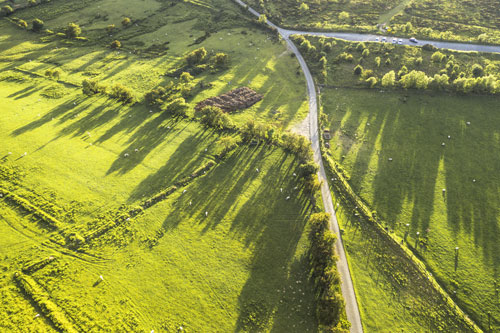Rural Land Sales – the growth of ‘lifestyle’ buyers
The farming sector is facing some challenges at the moment, and in particular the planned phase out of the Basic Payment Scheme is causing some farmers to consider options including early retirement or selling off some of their land. This may lead to an increase in farms/farm land being put up for sale.
The rural land market in Hertfordshire and the surrounding area is currently performing strongly, with terms of sale generally being agreed quickly and land often selling for a premium.
While there are likely a number of factors affecting the rural land market, one reason for this surge in interest is the rise of so-called ‘lifestyle’ buyers.
What is a lifestyle buyer?
Lifestyle buyers are generally people without a farming background who are buying rural land primarily for their own enjoyment or to support their own lifestyle, rather than to run as a commercial farm. They are often moving from city locations where the cost of property is much higher, so can afford to buy a small farm or other piece of rural land either as a second property or with the proceeds of the sale of their city home.
Lifestyle buyers are often looking for smallholdings or houses with a few acres of land, and properties with barns and other outbuildings tend to be the most sought after. Their plans can vary from simply wanting to own a property with some land in a rural setting, to producing their own food, keeping horses and other animals for their own enjoyment and/or operating holiday lets on the property.
Why has there been a growth in lifestyle buyers of farmland?
While lifestyle farming was already growing in popularity, the impact of the COVID-19 pandemic has seemingly driven a significant surge in interest.
This is likely driven by the overall trend for people looking to relocate out of cities during the pandemic. This seems to be due to people desiring more space, particularly more outside space, and the shift to remote working meaning many people no longer need to be in easy commuting distance of their workplace.
Another factor is the way the pandemic has encouraged many people to reassess their lives, their lifestyles and what they want. The idea of moving to the countryside and living a ‘simpler’ life has always had a strong appeal for many city dwellers and the pandemic appears to have given many of them the push to make the dream a reality.
Over the past 18 months we have also dealt with an increasing number of sales of farmland to adjoining house owners, looking to extend the size of their garden.
What do lifestyle buyers need to know when buying rural land?
Anyone without a farming background who is looking to buy rural land should make sure they do their home-work and are well prepared before making a purchase. Given how buoyant the market is currently, prospective buyers should be ready to move quickly – and have the funds ready – when they find a property they like.
There are also a number of key issues that commonly affect rural land that should be considered before making any purchase, including:
Restrictive covenants – many farms are subject to covenants restricting the use of the land to agricultural purposes (and/or rights of way being for agricultural purposes only). If the buyer wishes to use the land for other purposes, there may be a possibility of having such a covenant removed, but this can be challenging and there are no guarantees.
Planning permission – if the buyer intends to change the use of the property, make changes to any of the farm buildings and/or construct new buildings, planning permission in some form will usually be required. Although there are certain permitted development rights, these are not straight-forward and often still require additional forms of approval before work can be carried out.
In some cases, full planning permission will still be required. You should never assume that planning permission will be granted, so it is important to take expert advice before committing to a purchase if this would be required to make the property suitable for the buyer’s needs.
Environmental contamination – This can be an issue with agricultural land. Historic use of fertilisers or sheep dip etc. can potentially leave rural land subject to contamination issues. This is something that any buyer should thoroughly investigate before committing to a sale.
Longmores’ view on changes to the rural land market
If you are looking to purchase rural land, we would recommend hiring a land agent to assist you with the search as such land often exchanges hands privately, without actually being marketed.
A good buyer’s agent should be aware of land for sale that would meet your needs and will be able to assist you when agreeing the terms of the sale. We would also always recommend that you appoint a solicitor who is experienced in dealing with rural land, as there are certain issues that do not apply to other types of land and that need to be considered.
Speak to our Rural Land team for advice on rural land sales
To discuss the legal side of a rural land sale with our Rural Land team, please get in touch.
Please note the contents of this article are given for information only and must not be relied upon. Legal advice should always be sought in relation to specific circumstances.

